Finally we were able to play Assassin’s Creed Mirage, roam through the medieval open world and conclude in the gameplay conclusion: This game doesn’t deserve its reputation. And then somehow it does.
It must be frustrating! Sitting in front of me are a female developer and a male developer, I’m in France visiting Ubisoft Bordeaux, watching Assassin’s Creed Mirage. The two devs are demonstrating what they’ve been working on this week on screen in all its glory: a staircase in the middle of medieval Baghdad. Yes, a staircase.
This staircase has a tragic history. Ubisoft scans the entire open world with special software that has determined that the length and pattern of the stairs could trigger epileptic seizures in some people. So the two devs tear the thing down again, experiment with small intermediate levels to break the pattern and voila: Software gives the green light, stairs fixed.
I love studio visits for encounters like this. You get a glimpse of all the invisible work, the painstaking details that 99 percent of the time we don’t even notice in front of the computer or console – especially when the devs are doing a great job, ironing out epilepsy triggers, for example.
“Isn’t it frustrating sometimes when people don’t see how much work goes into a staircase alone?”, I ask Creative Director Stéphane Boudon. “Not at all,” he says. “It’s just part of the job. “
Assassin’s Creed Mirage generally struggles for recognition. Although over 250 people have been creating a medieval Baghdad here for years, many people in the comments on GlobalESportNews meet the game with a shrug. It’s the Assassin’s Creed in between the real Assassin’s Creeds, the little brother of Valhalla, before Codename Red and Witch really continue in a few years.
And even Ubisoft warns against false expectations. Mirage is smaller, cheaper, 35 hours of gameplay for 40 euros, no one officially denies that the thing was originally planned as a DLC expansion of the predecessor.
In return, Ubisoft also throws nostalgia into the mix: Mirage will be Assassin’s Creed like it used to be, a great homage to the very first part with a stealth focus, assassin gameplay, conspiracies and all the strengths we fell in love with back then.
A back and forth, so let’s cut to the chase: does Ubisoft’s idea work? I’m glad you asked, because I’ve played a total of three hours and I can say: Assassin’s Creed Mirage goes further in the right places than I thought possible. But it also stops in all the wrong places.
Table of Contents
The most important facts in fast forward
Okay, before we get to the really heavyweight issues, I’ll clear the most important known facts with you in fast forward:
- Assassin’s Creed Mirage is set in 9th century Baghdad, which is early medieval times during the so-called heyday of Islam.
- You are Basim, the controversial assassin from Valhalla, but the story takes place before the Viking Assassin’s Creed.
- The open world of Baghdad is about the size of Paris in Assassin’s Creed Unity. You travel both the city and the surrounding countryside to take down five powerful Templar bosses.
- Mirage does without the role-playing focus of the last Assassin’s Creeds with myriads of items and weapons, instead it wants to focus on stealth as a pure action adventure.
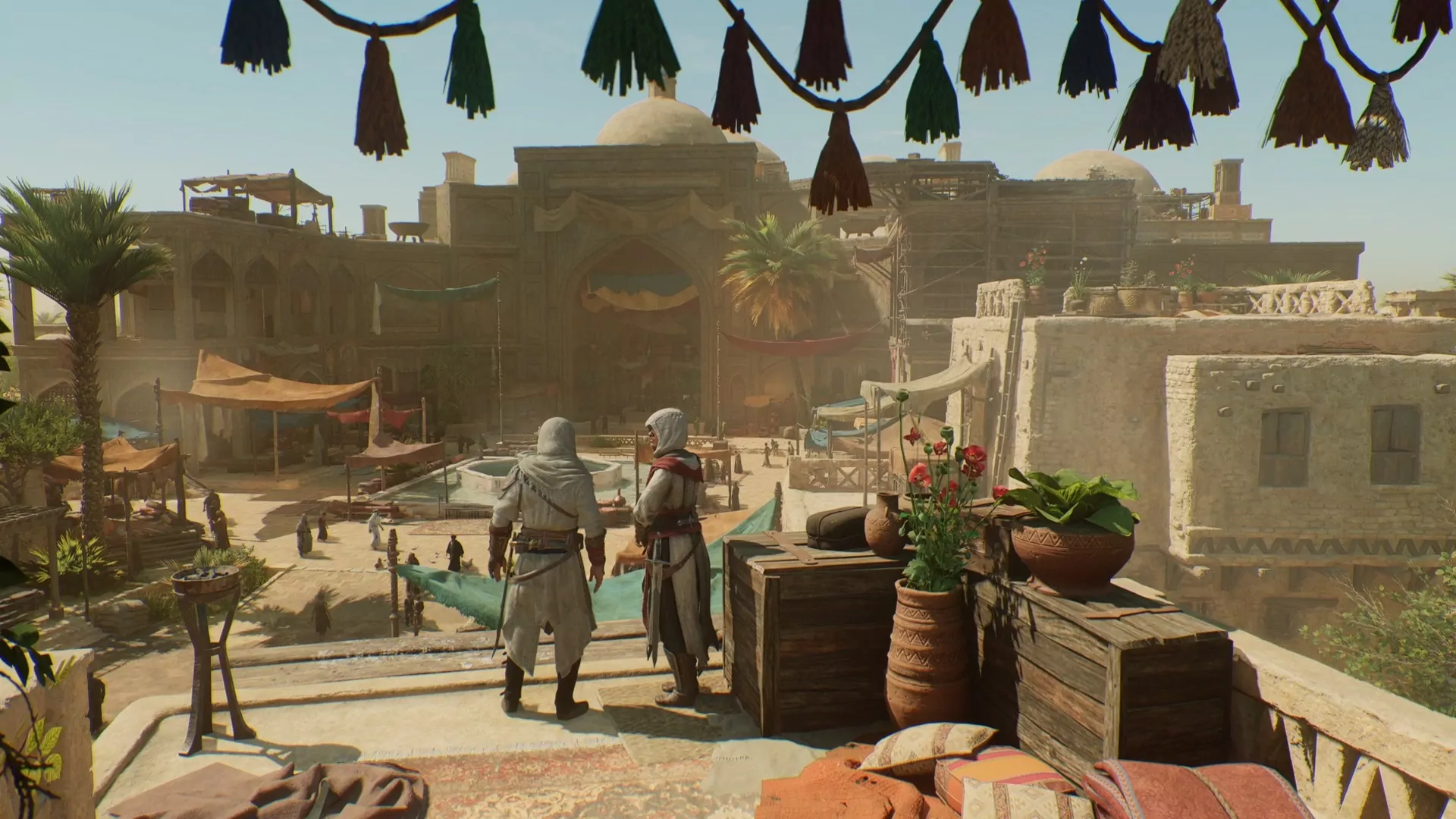
My first big surprise: the story of Assassin’s Creed Mirage actually makes me curious. Basim was pretty much the only exciting character in Valhalla, an internally torn Assassin with an ambivalent relationship to the Assassin’s Creed who enters Eivor’s life sometimes as an ally, sometimes as a mentor, sometimes as a villain.
In the first hour and a half of Mirage, he couldn’t be further from that. Basim steals, brawls and haggles his way through the streets of his home village, a swashbuckler and street dog who dreams of glory and justice. I witness his early training as an assassin in the half-finished fortress of Alamut (where centuries later Altair will seek refuge).
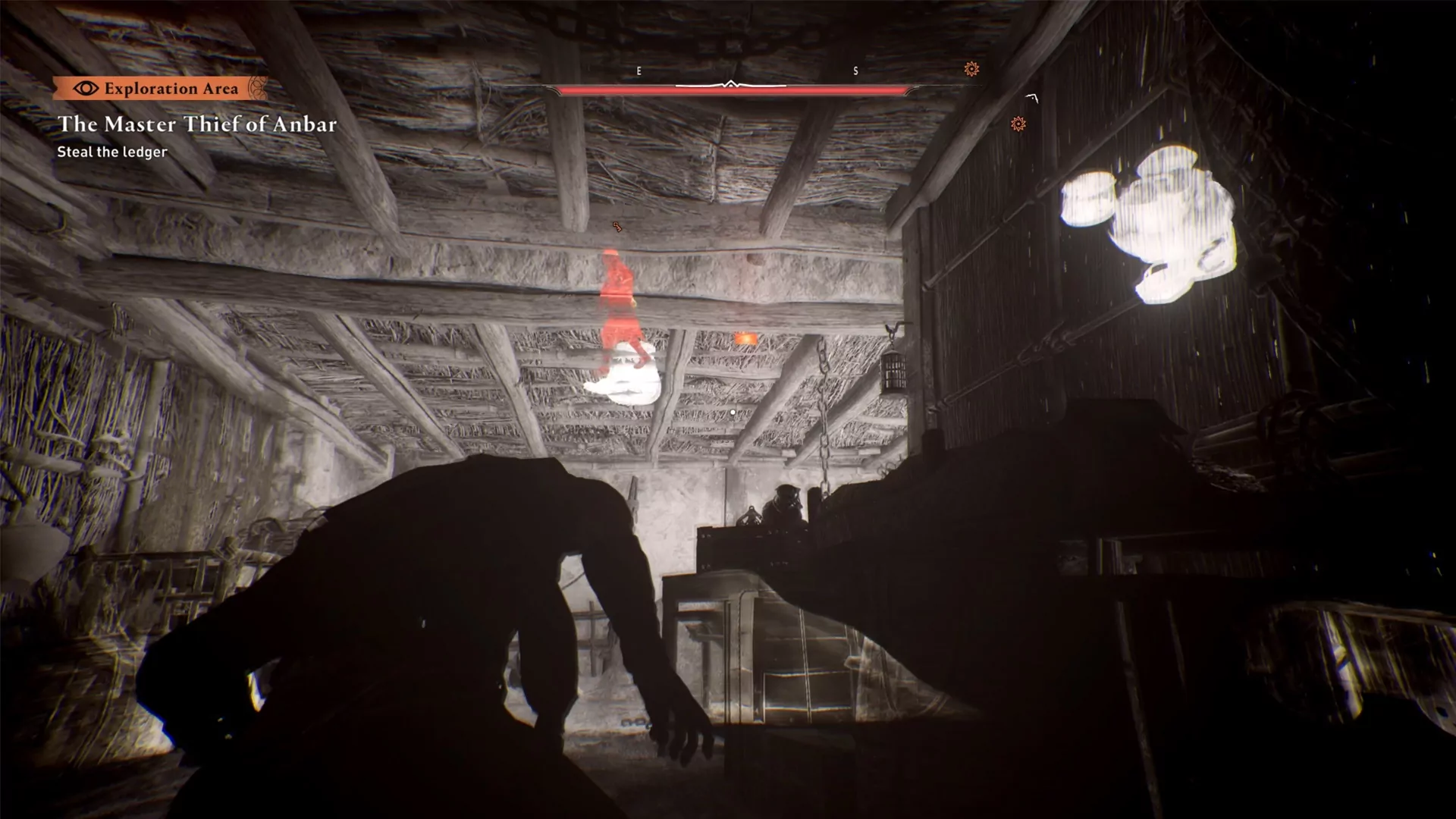
Although this ascension story from rapscallion to master assassin isn’t new (hello, Ezio), it a) feels incredibly refreshing to relive it after all these years and b) Mirage is just darn well directed in its first few hours. Ubisoft gives Basim and his companions room to establish themselves as clear players with desires, worries and problems, including a cool Rocky Balboa training montage.
The supporting characters are cool too, especially Mentor Roshan, voiced in English by Shohreh Aghdashloo, who pretty much steals the show with her smoky voice. The brotherhood in Mirage seems mysterious, the boundaries between friend and foe blur, in general the game here really revives many virtues that made the first Assassin’s Creeds so good. And we’re not even talking about the gameplay yet.
How well did the demo go? I played the demo on a PC provided by Ubisoft in Bordeaux. The version was a dev build, which means I could only play with the gamepad because various developer shortcuts were stored on the keyboard. In addition, recording software was constantly running in the background to record my game session. In short, the gameplay experience was anything but representative of normal gaming. The fact that the game crashed a few times and that there were visual bugs here and there is therefore very difficult to project onto the final product, especially since I don’t know how old the build was. Overall, though, the demo ran very smoothly for the most part.
This really feels different
The second big surprise: Assassin’s Creed Mirage really is a sneaking game! Here, Ubisoft Bordeaux clearly goes further than I gave them credit for. For years, Assassin’s Creeds have been moving in the direction of maximum openness: if I’m not up for tedious sneaking, I’ll just play my Cassandra in Odyssey as a double-whammy-hawk. Ubisoft seemed shy about asking players to make real compromises – for fear of frustrating them.
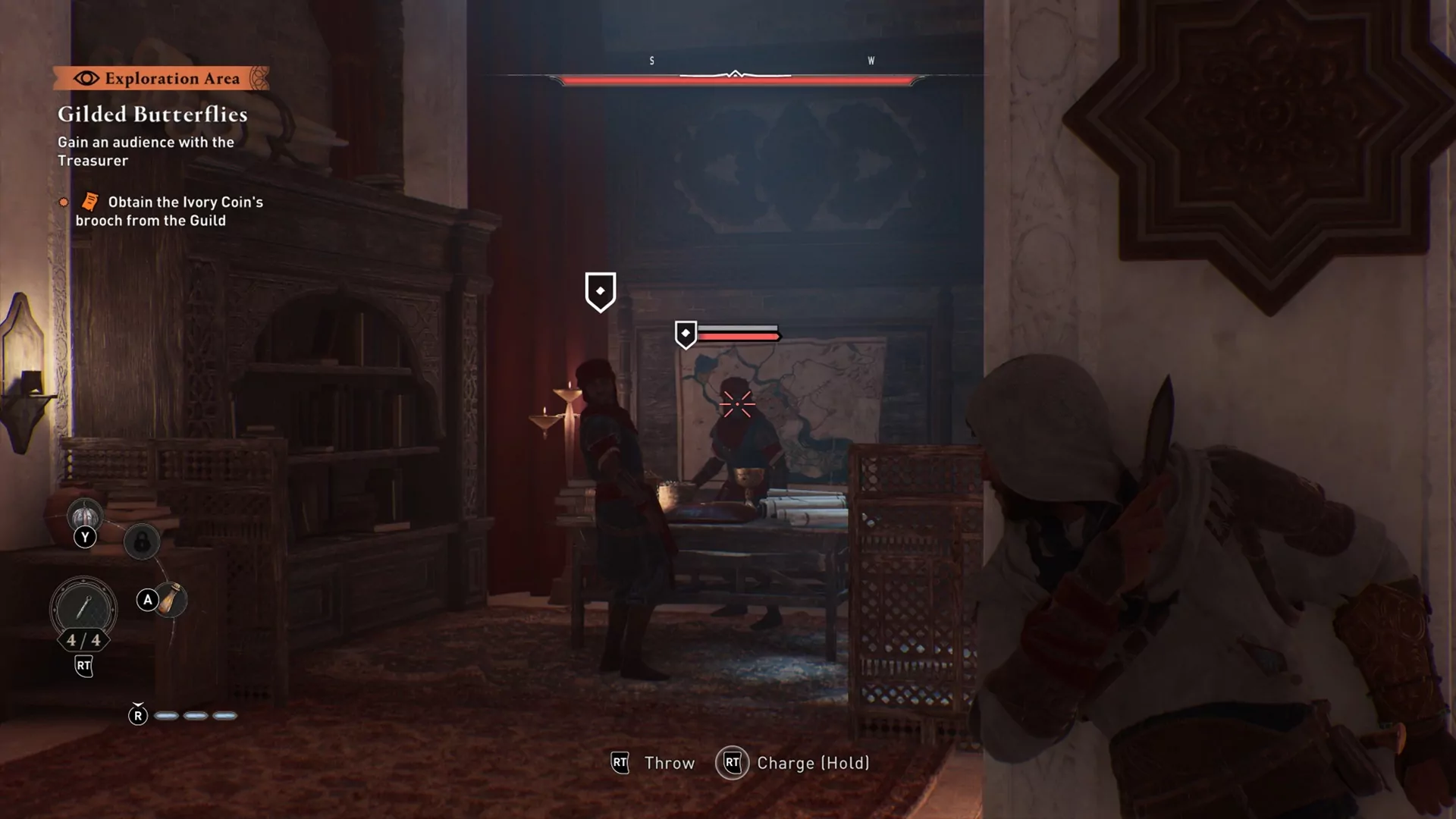
Mirage has no fear there. Basim can certainly defend himself with dagger and sword – the combat system consists of light and heavy attacks including parries – but a troop of elite opponents sends me to the boards so quickly even at normal toughness level that I cheerfully sum up: “Yes, I really have to sneak, otherwise they’ll bash my head in.
Are there microtransactions? Yes, Assassin’s Creed Mirage also includes a real-money shop, which was explicitly not yet finally implemented in the demo. I saw the usual skin packages to give Basim his outfit from Valhalla or Altair’s costume, for example. Mirage shouldn’t have any aggressive Pay2Win monetisation, though, especially since the game doesn’t artificially stretch or slow down its playtime.
In addition, as in the old series, if I engage with too many guards, my tracking level increases – and on the third level I’m hunted by such fierce killers that the Hessian mercenaries from Assassin’s Creed 3 seem like little flies in the ointment.
The stealth gameplay remains close to its predecessor Valhalla: Basim stalks through tall grass, whistles at unwary enemies, but everything flows a little better. The assassination animation is quicker, and in densely built Baghdad there are of course many more cool possibilities for out-of-air assassinations than in sprawling England.
Basim also has a lot of tools that I really need to use. I use traps and noisemakers to lure enemies to their deaths, smoke bombs to get away quickly, and throwing knives are an absolute blessing. In general, Mirage is simply wonderfully compact: every tool is useful, every encounter exciting, no unnecessary experience point grind.
How does the gameplay work?
Keyword “experience points”: Gone are the days of eternal levelling up to deal 2.5 percent more melee damage here and 3.5 percent more stealth damage there. Mirage is not a role-playing game.
As I progress through the story and complete quests, Basim gets skill points, but the skill tree is very compact: my bird can suddenly tag enemies more easily, my bag holds more stuff, and here and there a new ability awaits, for example the automatic knife throw at a second enemy after I assassinate the first.
The supernatural outlier here is a multi-assassination, in which Basim teleports to several enemies. But if you don’t want to use such gimmicks, you’ll be fine without them.
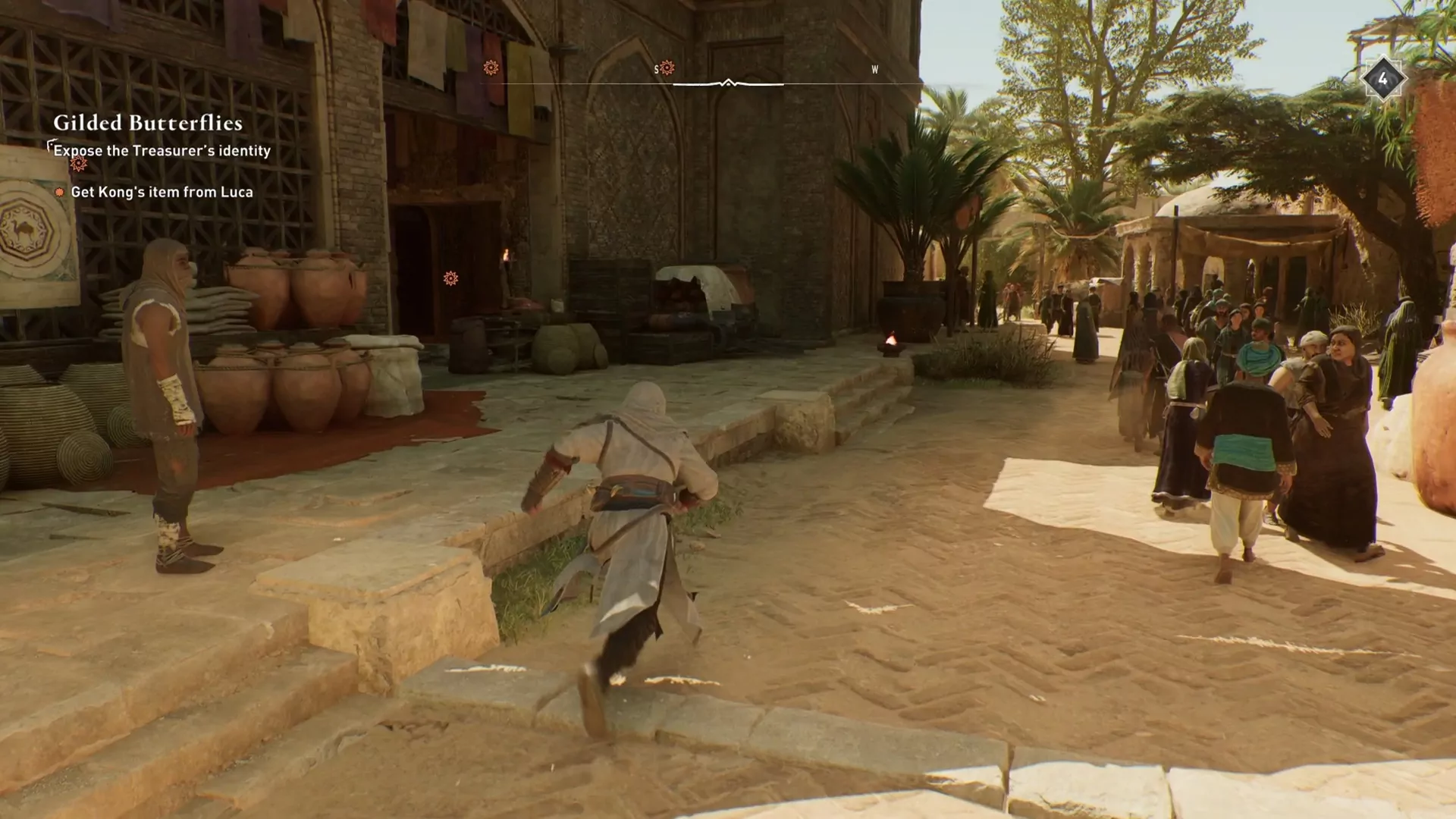
Generally, everything in Mirage is so wonderfully compact – even the Open World! I don’t have to chase flying notes, collect goofy feathers, stack rocks, sit through booze mini-games, form patterns in the landscape. Ubisoft clearly distances itself here from the activity overkill of a Valhalla. There are significantly fewer distractions in the alleys of Baghdad – and the activities I’ve played feel more meaningful for it.
For example, I still find valuable crates in guarded hideouts that contain new weapons or armour. Or materials with which I can upgrade them. However, these upgrades do not simply boost any stats at random, but rather promote certain play styles in a targeted manner. Class instead of mass. Do you like to use throwing knives? Then this outfit, which doubles throwing knife damage, is worthwhile.
I had to empty someone’s pockets here, climb a tower there, but Mirage has maybe 20 percent of the open-world nonsense from the predecessor. And this purging is really good for the game.
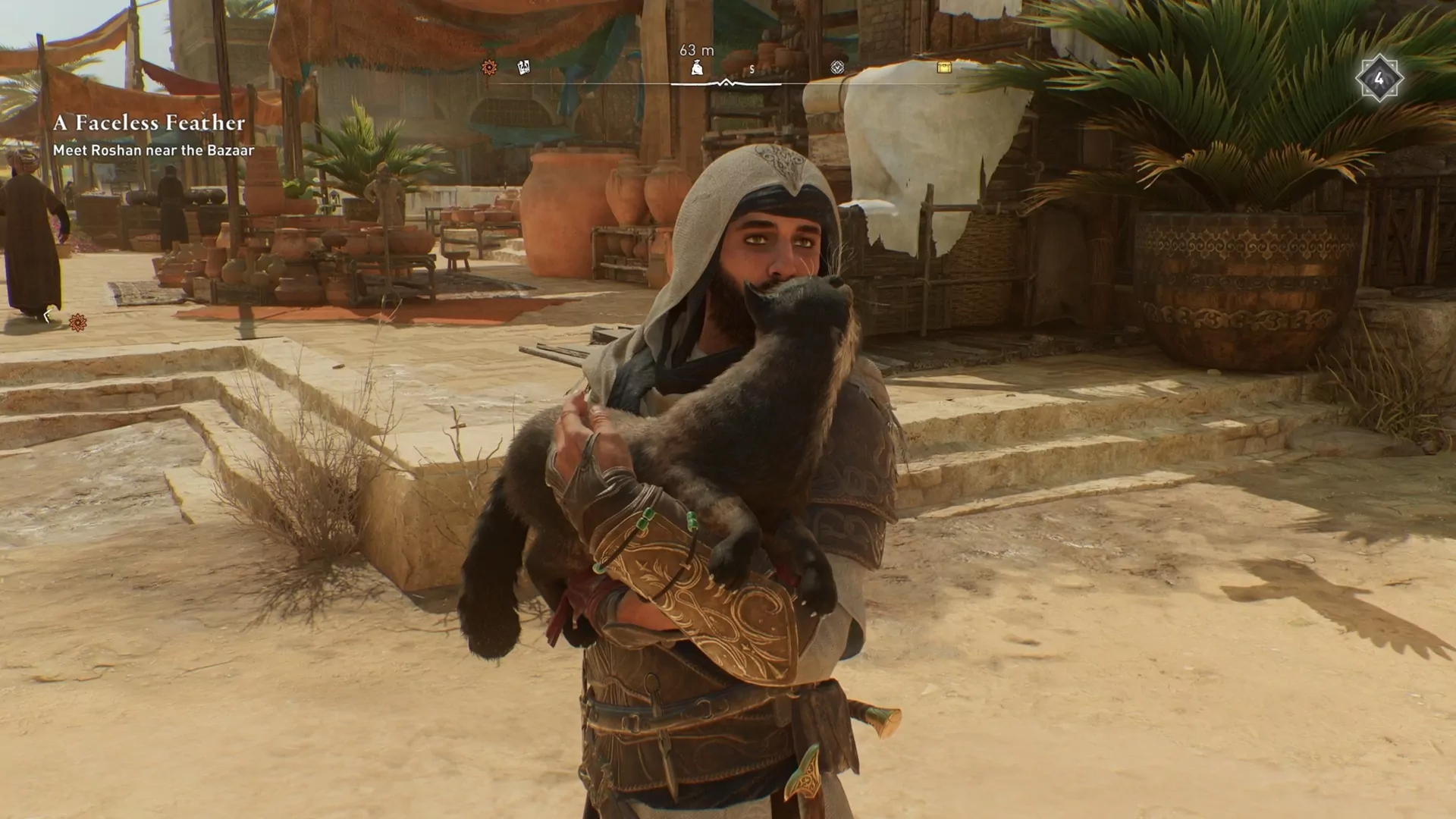
Unfortunately, unfortunately, there are still the horrible World Events from Valhalla, i.e. tiny, gameplay-less quests. I haven’t been able to play them yet, so I’ll remain cautiously optimistic: in the end, it’s the content that counts. If the nice little side stories are well told, I’ll be the last to complain, as long as I don’t have to help a woman fart or a couple get laid again.
Generally, Mirage feels primarily story-based: In the first hour and a half I don’t experience any open-world activities at all, after that there was a jump to a later game state in the demo – and even here the open-world diversions take up much less space compared to the main quest than in previous series parts. Almost all activities are connected to the big goal of freeing Baghdad from the murderous Templars.
There are a few problem areas, however.
Problem Zone 1: Parkour
What else was part of the old Assassin’s Creed? That’s right: parkour. And indeed, given the narrow streets of Baghdad, Basim often dashes across rooftops to get from A to B quickly. If Mirage had the technical framework of Assassin’s Creed Unity … oh, the acrobatics could play fantastically. But alas, it didn’t.
The engine of Assassin’s Creed Valhalla can only be used to a limited extent – Mirage’s former existence as DLC is evident here: The parkour gameplay is not really good. The devs pack the whole city full of crossbars, ramps and crates so that Basim can get into a flow, but they disregard what actually makes parkour good: that I can actually play and experiment with it!
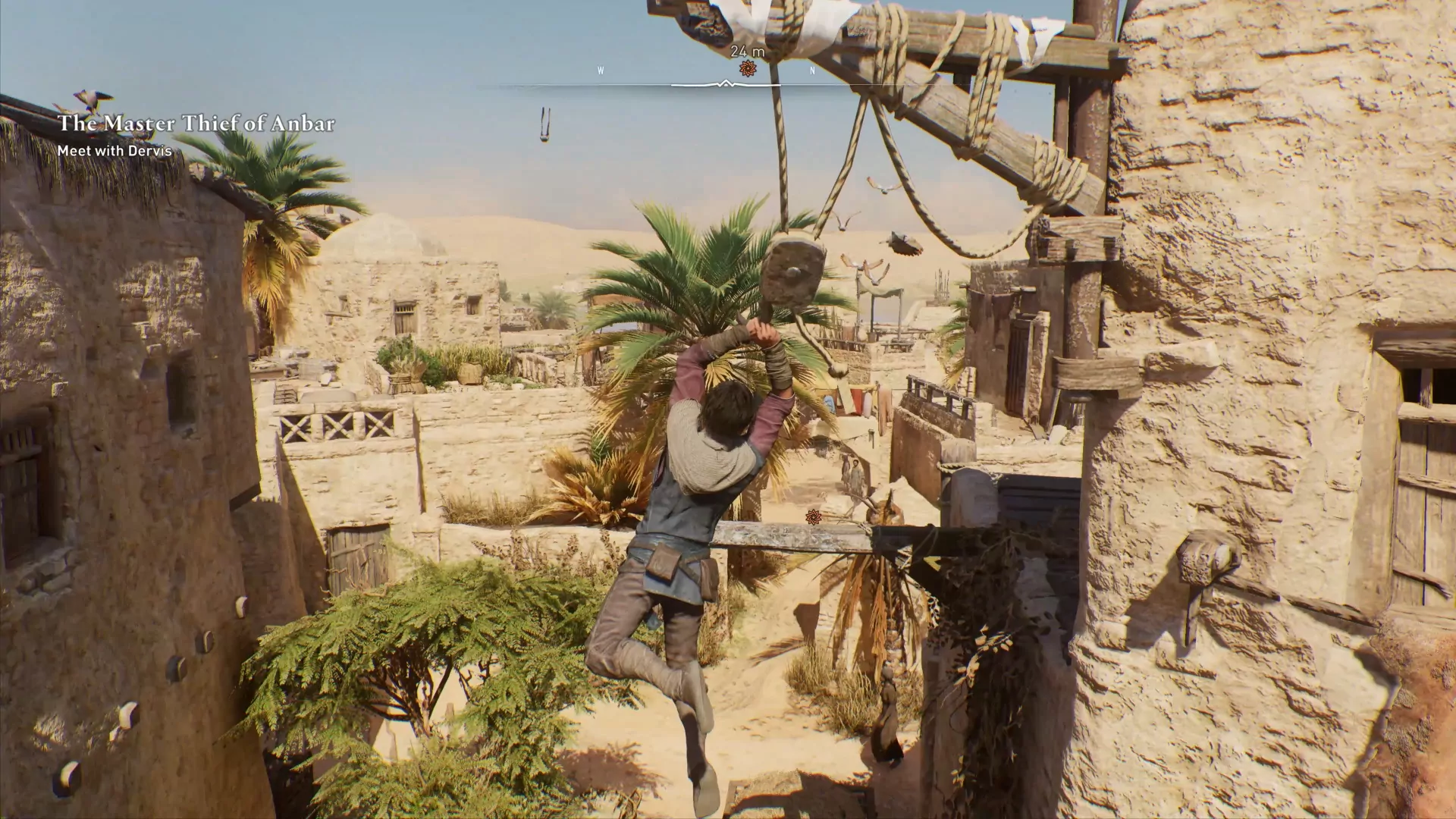
In the very first Assassin’s Creeds, for example, Altair and Ezio could decide for themselves whether to run up a wall, hop sideways onto a crossbeam while still running, and from there hop up onto a roof. If Altair misses, I manually grab the next best ledge. In Unity I could decide for myself whether I preferred to “parkour” from a balcony along the facade of a building or onto the roof – there were separate buttons for parkour up and down. In Mirage, none of that works. Instead, I run. And press A.
Unlike Eivor, Basim can no longer climb any surface, but has to look around for ledges, but instead I follow all the obvious ramps and flower pots created by the developers. And because I have so little manual control, Basim keeps jumping off course or not doing exactly what I want to do.
But well, most fans shouldn’t care so much – in the end I have to get from A to B and that works out quite quickly on average thanks to all the rooftops.
Problem Zone 2: The Black Box Missions
Meanwhile, the return of the so-called Black Box missions from Assassin’s Creed Unity, assassination missions in which I am thrown into an area like in Hitman and have to search for clues and opportunities myself in order to plan my perfect kill, was highly touted.
In Mirage, my demo black box takes place in a bazaar. I’m supposed to kill an ominous treasurer, but I don’t know his identity – to change that, I help people in the bazaar with their little problems, sneak into an auction and get myself a valuable Chinese hairpin to offer it to the target as a gift in the privacy of my own room. And then kill her.
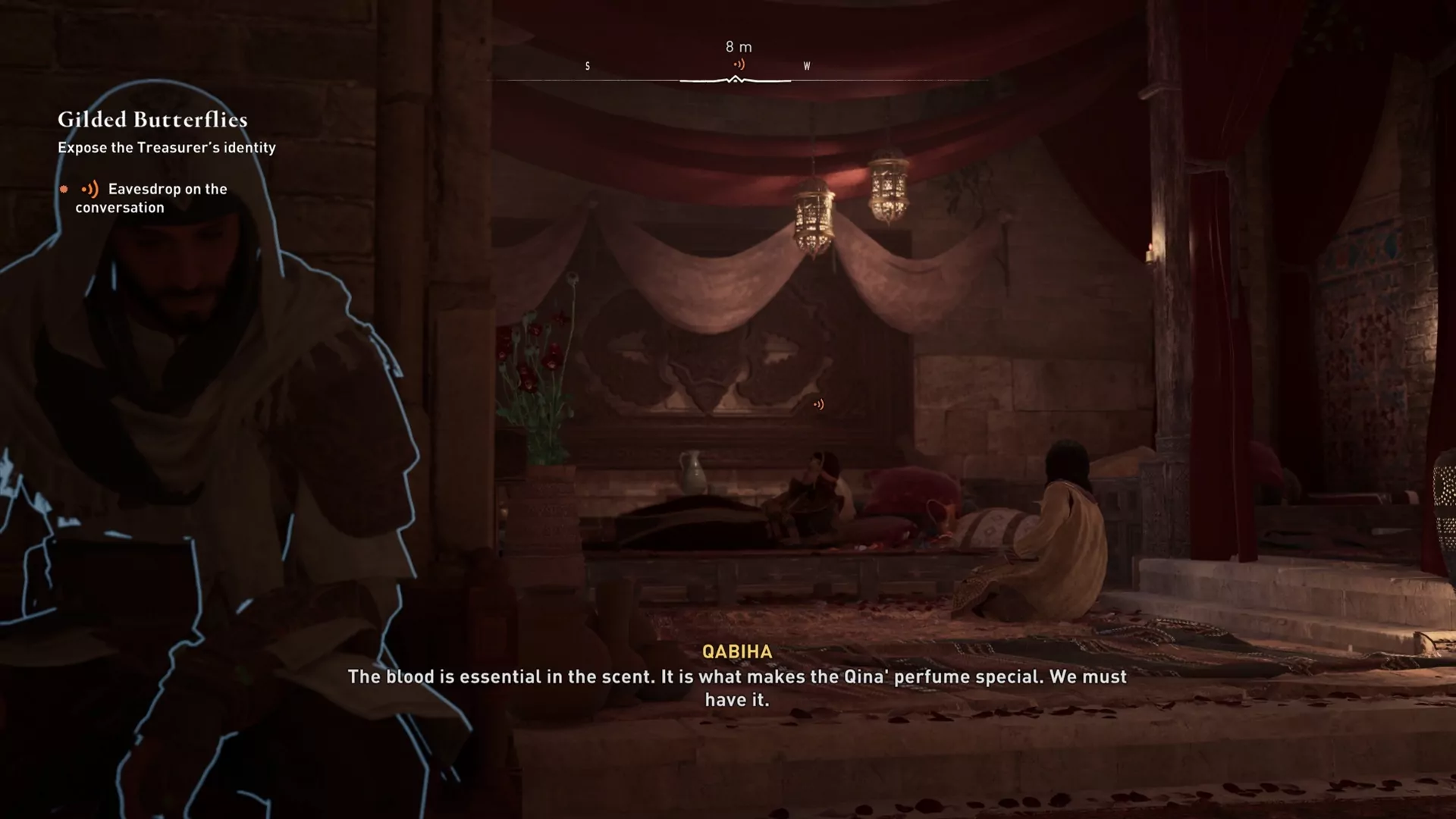
In theory a really cool mission, but in practice Basim’s freedom of choice is limited to a few trivial little things. For example, I can bid for the valuable hairpin myself on the action or let someone else win, only to steal the hairpin from him afterwards. And on the assassination itself, I watch a cutscene or run straight in and pierce the target’s ear again.
The mission itself is fun and cool staged, but I don’t see the great promise of sandbox freedom anywhere here.
You have to know what you want
Despite this, as someone who had little joy with Valhalla, I’m really, really taken with Assassin’s Creed Mirage. Ubisoft Bordeaux isn’t just building Potemkin villages, the whole “back to the roots” thing is more than just PR blah blah and Mirage is a genuine sneaky game. It feels so refreshing to experience a real assassin story again, and the story makes me curious precisely because I know what kind of person Basim will ultimately become in Valhalla.
You just have to know what to expect. Mirage lives up to its reduced price: it’s not the next big evolutionary step of Assassin’s Creed, but feels more like a spin-off, a separate, somewhat smaller chapter that can easily stand on its own. If the full version keeps up the quality of the play-on demo, it could be one of my little highlights of 2023. As long as the World Events don’t turn out like Valhalla.
Editor’s Verdict
I didn’t believe Ubisoft’s marketing for a second. Back to the roots, Assassin’s Creed like it used to be, exciting story, lots of parkour, stealth focus, yes, yes, if I got five euros for every “Back to the Roots” from a major publisher, I would now be rich enough to rent a garage parking space in Munich. And that’s saying something!
And to some extent the restraint remains justified. Assassin’s Creed Mirage’s origins as a DLC are obvious, the parkour system is just a nice facade, the free-running in the background works just as unreliably as in Valhalla. And I also don’t see the big promises of non-linear sandbox missions realised anywhere in the demo.
But I was also wrong. Assassin’s Creed Mirage is by no means a shallow fanservice jumble that tries to pander to every possible target group, but rather I sense a razor-sharp design focus while playing that clearly conveys: In Mirage, you’re supposed to sneak. If you want to brawl, you’re in the wrong place. If you want a giant role-playing game, you’re wrong. If you don’t care about the assassin story, you’re wrong.
And conversely, as a veteran fan, I feel spot on, because Basim’s story finally piques my curiosity again, I’m not being asked to play 2,000 open-world icons, and I feel like Ubisoft Bordeaux is selling me an honest package here, completely without service-game compulsion. And that feels really good for a change.


